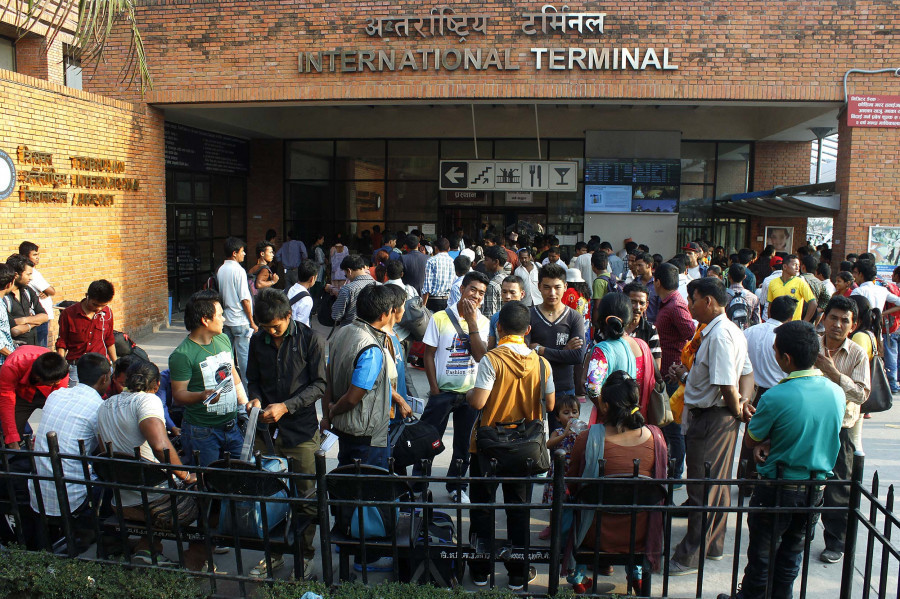National
Nepali mission in Qatar resumes verifying workers’ demand letters
Recruiting agencies happy with the resumption of the verification process, but unconvinced that select agencies are not being given exclusive rights to send Nepali workers to Qatar.
Chandan Kumar Mandal
The Nepali embassy in Qatar has resumed verifying demand documents of prospective migrant workers months after halting the process due to the Covid-19 pandemic.
In a bid to control the spread of Covid-19, the government had completely stopped labour migration between mid-March and the end of August. Following the halt, Nepali missions in labour destination countries also had stopped verifying demand documents of prospective workers.
According to Sujeet Kumar Shrestha, general secretary of Nepal Association of Foreign Employment Agencies (NAFEA), a grouping of recruiting agencies hiring and supplying Nepali migrant workers to foreign employers, demand verification for Qatar resumed from Sunday.
“During a recent meeting with the Nepali ambassador to Qatar and the labour counsellor there, we have been told that attestation of workers demand would begin from Sunday,” said Shrestha.
“The decision comes as a respite for recruiting agencies that have for many months been waiting for the process to resume so that they can start sending workers abroad.”
As per a directive, which was implemented in 2018, foreign employers who wish to hire Nepali workers have to first get workers’ demand documents verified by Nepali missions in the respective country. Only then can the other processes of hiring workers begin in Nepal.
Recruiting agencies have long been criticising Nepali missions in labour destination countries for not verifying the workers demand documents even after the government decided to resume labour migration. They have been demanding that all Nepali missions resume the service as tens of thousands of Nepali workers have been waiting for a long time.
Tikamani Neupane, spokesperson for the Department of Foreign Employment, all the Nepali missions in labour destination countries will soon resume their demand verification service.
“All missions will soon resume the service. It was halted due to the Covid-19 situation in major labour destination countries,” Neupane told the Post. “It was never officially closed, but Nepali missions had stopped the service as they were worried allowing more workers in would add to the problems.”
For several years, the gas-rich Qatar has remained one of the top-major labour destination countries for Nepali migrant workers. According to the Nepal Labour Migration Report 2020, published by the Labour Ministry, 29.1 percent of all migrant labourers went to Qatar in 2017-18 and 31.8 in 2018-19.
In 2017-18, 183,542 received permits to work in Qatar, followed by 161,215 in 2018-19. Last fiscal year, which recorded a massive decline in migration numbers due to the Covid-19 pandemic saw 81,567 Nepali workers go to Qatar.
Another contested issue that has emerged in labour migration to Qatar lately has been the alleged formation of a “syndicate” among 16 recruiting agencies for sending Nepali workers to Qatar. There are allegations that the government is planning to give exclusive rights to select agencies to send workers to Qatar.
Following complaints, a meeting of the Commerce, Labour and Consumer Welfare Committee of Parliament on November 10 directed the Ministry of Labour, Employment and Social Security to investigate the case and submit a report to the committee. The next day, the Labour Ministry formed a five-member committee, led by the director- general of the foreign employment department to study the matter.
During a meeting of recruiting agency representatives with Yousuf Bin Mohamed Ahmed Mohamed Al- Hail, Qatar’s ambassador to Nepal, the envoy assured that such a syndicate would not be allowed to dictate hiring of Nepali workers in Qatar, according to Shrestha.
“The ambassador told us that his government does not support any kind of syndicates while hiring workers. We were informed that the Qatar government was willing to hire Nepali security guards,” said Shrestha. “Through a letter written to the Qatar embassy in Kathmandu, we have offered our support in helping the Qatari government select the finest Nepali recruiting agencies which can supply Nepali security guards.”
According to Shrestha, they have also requested the Qatar embassy to implement fair and ethical recruitment practices.
“Qualified recruiting agencies can be selected through an open competition after they meet the standards, which can be developed, rather than selecting a few through a syndicate,” he said.
However, not all recruiting agencies representatives easily believe that syndicate in hiring Nepali workers for Qatar is merely a rumour.
Another office bearer at the Nepal Association of Foreign Employment Agencies (NAFEA) said that as the Qatar embassy hasn’t officially replied to the letter, something might be cooking behind the scenes.”
“We have heard that a team from Qatar is already in Nepal to select recruiting agencies to supply workers. Also, those agencies which are reportedly part of the syndicate are conducting interviews with aspiring candidates,” said the source, who did not want to be named. “If the Qatari government is itself selecting a group of recruiting agencies for supplying workers, then this is against Nepal’s foreign employment laws.”




 16.12°C Kathmandu
16.12°C Kathmandu















